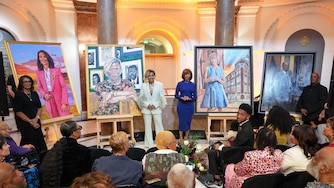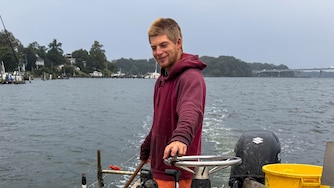In 1985, the prolific cult filmmaker John Waters, one of Baltimore’s most famous citizens, was assigned by Rolling Stone magazine to interview Leslie Van Houten, who was serving a life sentence in the California Institution for Women for her role in the infamous “Helter Skelter” murders in Los Angeles.
Van Houten had been twice convicted of the murders of Leno and Rosemary LaBianca. Waters was by then known for his avant-garde, transgressive films and regarded as the master of trash cinema. In his 2010 book, “Role Models,” he wrote about his early obsession with the Charlie Manson murders. One of his first films, “Multiple Maniacs,” made reference to the killings. The day after the film came out in 1970, he attended Manson’s trial in Los Angeles. By 1985 his filmmaking was moving into the mainstream, but his fascination with the Manson followers had not abated.
According to Waters’ book, Rolling Stone originally asked him to interview Manson but he convinced editors to let him interview Van Houten instead; she was the figure he was most intrigued by. He first contacted her with a sympathetic letter that garnered a guarded but open response. She told him she needed to take it slowly. A steady exchange of letters led to their first meeting in prison. More letters and visits followed over the next few years.
In 1987, she wrote to Waters: “I feel good about you because I do not believe you would harm me. You make me feel good about myself. ... I need that ... not to feel like a freak. I’d like to propose that this year we become closer friends. You inspire me to do something with myself.”
She inspired Waters, too: “Inspired me to believe that if you wait long enough and work hard enough on your damaged psyche you can eventually come out of it with some kind of self-respect and mental health.”
So began a decadeslong friendship.
When Waters’ muse, actor Harris Glenn Milstead, better known by the drag queen persona Divine, died in 1988, Van Houten consoled the filmmaker in a letter.
“I’m so sad and wish I could be closer for you,” she wrote. “I know you loved him and enjoyed in the success of his life and helped him through his hard times. ... I am sorry I will not get to know him.”
In 2010, after more than two decades of friendship, Waters publicly advocated for Van Houten’s release.
Responding by email this week, Waters declined to give an interview for this article. He is presumably among those who welcomed the news of Van Houten’s release. Many did not, including the relatives of the victims and California Gov. Gavin Newsom, who three times rejected the parole board’s recommendation to release her. Van Houten was 19 at the time of the murders. (She is 73 today.) She has been open and candid about her participation, and also about her regret and remorse. She was sentenced to death for the murders after her first trial in 1971. The next year, California abolished the death penalty and her sentence was commuted to life. Her conviction was overturned in 1976. She was retried twice before finally receiving another life sentence that allowed for the possibility of parole. She was denied 20 times before a panel finally recommended her for parole in 2016.
By then, Waters had become an outspoken supporter.
He wrote in his 2010 book, “I have a really good friend who was convicted of killing two innocent people when she was nineteen years old on a horrible night of 1969 cult madness. Her name is Leslie Van Houten and I think you would like her as much as I do. ... I think it’s time to parole her.”
Waters also wrote about his long preoccupation with the Manson family. They “looked just like my friends at the time!” He was especially drawn to Van Houten, whom he described as the “homecoming princess from suburbia who gave up her title for acid. The all-American girl who went beyond insanity to unhinged criminal glamour just like Mona, my last girlfriend, who took LSD and shoplifted and starred in my underground movies all under my influence.”
Waters viewed her as a kindred spirit and imagined how she might have been a part of his creative world. He could easily imagine casting her in his movies, all of which were set and filmed in Baltimore, where he still mainly resides.
“Leslie Van Houten always seemed the one that could have somehow ended up making movies with us instead of running with the killer dune-buggy crowd,” he wrote in “Role Models.” “She was pretty, out of her mind, rebellious, with fashion-daring, a good haircut, and a taste for LSD — just like the girls in my movies. ... If Leslie had met me instead of Charlie, could she have gone to the Cannes Film Festival instead of the California Institute for Women? Actually, I think if Leslie hadn’t met either of us she might have ended up as a studio executive in the movie business in Los Angeles. A good one, too.”




Comments
Welcome to The Banner's subscriber-only commenting community. Please review our community guidelines.